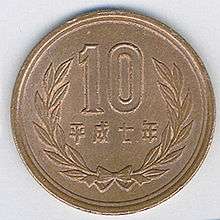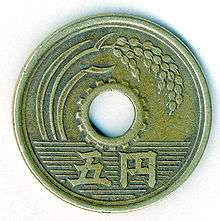10 yen coin
| Japan | |
| Value | 10 Japanese yen |
|---|---|
| Mass | 4.5 g |
| Diameter | 23.5 mm |
| Thickness | 1.5 mm |
| Edge |
Serrated (1951-1958) Smooth (1959-) |
| Composition |
95% Cu 3-4% Zn 1-2% Sn[1] |
| Years of minting | 1951–present |
| Catalog number | - |
| Obverse | |
 | |
| Design | Phoenix Hall of Byōdō-in |
| Reverse | |
 | |
| Design | Bay laurel leaves |
The 10 yen coin (十円硬貨 Jū-en kōka) is one denomination of Japanese yen.
The obverse of the coin depicts the Phoenix Hall of Byōdō-in, a Buddhist temple in Uji, Kyoto prefecture, with the kanji for "Japan" and "Ten Yen." The reverse shows the numerals "10" and the date of issue in kanji surrounded by bay laurel leaves.
10-yen coins issued between 1951 and 1958 have serrated edges, while 10-yen coins issued from 1959 onward do not.
Circulation figures
Showa
The following are circulation dates which cover Emperor Hirohito's reign. The dates below correspond with the 26th to the 64th year (last) of his reign. All ten yen coins that were made before 1959 have serrated edges, this has since changed to the present day smooth edge. Coins for this period will all begin with the Japanese symbol 昭和 (Showa).
- Japanese coins are read with a left to right format:
- "Emperors name" -> "Number representing year of reign" -> "Year" (Ex: 昭和 -> 三十四 -> 年).
| Year of reign | Japanese date | Gregorian date | Mintage[2] |
|---|---|---|---|
| 26th | 二十六 | 1951 | 101,068 |
| 27th | 二十七 | 1952 | 486,632 |
| 28th | 二十八 | 1953 | 466,300 |
| 29th | 二十九 | 1954 | 520,900 |
| 30th | 三十 | 1955 | 123,100 |
| 31st | 三十一 | 1956 | 0 |
| 32nd | 三十二 | 1957 | 50,000 |
| 33rd | 三十三 | 1958 | 25,000 |
| 34th | 三十四 | 1959 | 62,400 |
| 35th | 三十五 | 1960 | 225,900 |
| 36th | 三十六 | 1961 | 229,900 |
| 37th | 三十七 | 1962 | 284,200 |
| 38th | 三十八 | 1963 | 411,300 |
| 39th | 三十九 | 1964 | 479,200 |
| 40th | 四十 | 1965 | 387,600 |
| 41st | 四十一 | 1966 | 395,900 |
| 42nd | 四十二 | 1967 | 158,900 |
| 43rd | 四十三 | 1968 | 363,600 |
| 44th | 四十四 | 1969 | 414,800 |
| 45th | 四十五 | 1970 | 382,700 |
| 46th | 四十六 | 1971 | 610,050 |
| 47th | 四十七 | 1972 | 634,950 |
| 48th | 四十八 | 1973 | 1,345,000 |
| 49th | 四十九 | 1974 | 1,780,000 |
| 50th | 五十 | 1975 | 1,280,260 |
| 51st | 五十一 | 1976 | 1,369,740 |
| 52nd | 五十二 | 1977 | 1,467,000 |
| 53rd | 五十三 | 1978 | 1,435,000 |
| 54th | 五十四 | 1979 | 1,207,000 |
| 55th | 五十五 | 1980 | 1,127,000 |
| 56th | 五十六 | 1981 | 1,369,000 |
| 57th | 五十七 | 1982 | 890,000 |
| 58th | 五十八 | 1983 | 870,000 |
| 59th | 五十九 | 1984 | 533,850 |
| 60th | 六十 | 1985 | 335,150 |
| 61st | 六十一 | 1986 | 68,960 |
| 62nd | 六十二 | 1987 | 165,775 |
| 63rd | 六十三 | 1988 | 618,112 |
| 64th | 六十四 | 1989 | 74,692 |
Heisei
The following are circulation dates in the reign of the current Emperor. Akihito was crowned in 1989, which is marked with a 元 symbol on the coin as a one year type. Coins for this period all begin with the Japanese symbol 平成 (Heisei).
- Japanese coins are read with a left to right format:
- "Emperors name" -> "Number representing year of reign" -> "Year" (Ex: 平成 -> 三 -> 年).
| Year of reign | Japanese date | Gregorian date | Mintage[2] |
|---|---|---|---|
| 1st | 元 | 1989 | 666,308 |
| 2nd | 二 | 1990 | 754,953 |
| 3rd | 三 | 1991 | 632,120 |
| 4th | 四 | 1992 | 538,130 |
| 5th | 五 | 1993 | 249,240 |
| 6th | 六 | 1994 | 190,767 |
| 7th | 七 | 1995 | 248,874 |
| 8th | 八 | 1996 | 546,213 |
| 9th | 九 | 1997 | 491,086 |
| 10th | 十 | 1998 | 410,612 |
| 11th | 十一 | 1999 | 359,120 |
| 12th | 十二 | 2000 | 315,026 |
| 13th | 十三 | 2001 | 542,024 |
| 14th | 十四 | 2002 | 455,667 |
| 15th | 十五 | 2003 | 551,406 |
| 16th | 十六 | 2004 | 592,903 |
| 17th | 十七 | 2005 | 504,029 |
| 18th | 十八 | 2006 | 440,594 |
| 19th | 十九 | 2007 | 388,904 |
| 20th | 二十 | 2008 | 362,811 |
| 21st | 二十一 | 2009 | 338,003 |
| 22nd | 二十二 | 2010 | 328,905 |
| 23rd | 二十三 | 2011 | 255,936 |
| 24h | 二十四 | 2012 | 279,211 |
| 25th | 二十五 | 2013 | 100,892 |
| 26th | 二十六 | 2014 | 171,013 |
| 27th | 二十七 | 2015 | 203,004 |
| 28th | 二十八 | 2016 | - |
References
- ↑ "10 yen coin". Bank of Japan. Archived from the original on 2008-10-03. Retrieved 2008-10-03.
- 1 2 "Circulation figures" (PDF). Japan Mint. Retrieved August 27, 2016.

